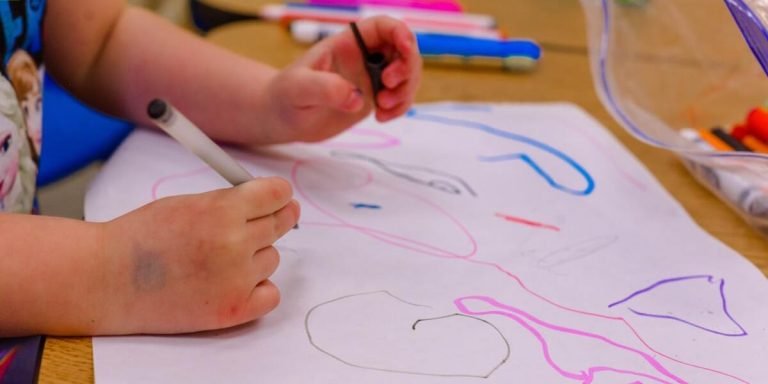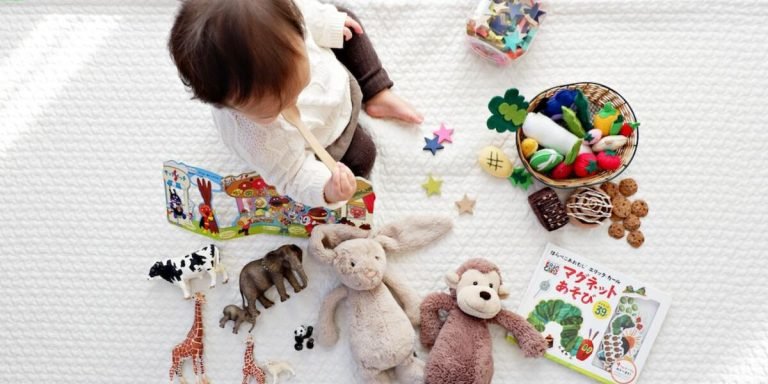Home Workshop: A Key to Sparking Your Child’s Interest in Learning Practical Skills
Creating a home workshop is an innovative and effective way to spark your child’s interest in learning practical skills. Not only does this offer the experience of hands-on activities, it also nurtures creativity and builds problem-solving abilities – key ingredients for academic success.
Activity-based learning provides children with real-world applications for concepts taught in traditional education settings. By incorporating tasks that allow youngsters to see their learnings come alive within the safe confines of a home workshop, parents can give kids not just knowledge but also confidence & life-long skills.
Did you know?
Did you know? According to a Michigan State University study, children who are exposed to home workshops and practical learning activities at an early age exhibit heightened technical understanding and cognitive skills that can serve them well in their future careers.
Exploring the Benefits of Activity-Based Learning in Home Workshops
Activity-based learning in home workshops has seen a significant rise as an effective educational methodology, particularly with the advent of technology. As we live through 2023, our world is more digitally connected than ever before and remarkably advanced technological resources are readily accessible to us all. This evolution offers a unique opportunity for parents and educators alike to leverage these tools within their teaching methods at home.
An essential part of this shift towards tech-integrated education is Activity-Based Learning (ABL). Home workshops embellished with engaging activities empower children to engage directly with learning concepts rather than merely act as passive receivers of information. These interactive experiences not only make complex ideas more digestible but also foster creativity, critical thinking skills and hands-on problem-solving abilities in young learners.
Moreover, while traditional classroom pedagogy might appear monotonous or restrictive for some students; activity-based learning coupled with technology integration sparks curiosity ensuring they remain attentive throughout lessons – leading them on explorations into subjects that might otherwise seem intimidating or uninteresting. By leveraging ‘learning by doing’, ABL empowers youngsters to conquer challenges independently making abstract principles palpable — even from the comfort of their homes!
Understanding How Hands-On Experience Enhances Skill Acquisition
Take the concept of activity-based learning (ABL), for example. ABL is not a new educational philosophy but has gained significant attention recently with educators and parents alike recognizing its values to our digitally-native youngsters.
Activity Based Learning allows children to learn by doing – making things happen through direct experiences and focused interactions. And when it comes to creating such immersive, engaging environments at your own homes, home workshops are playing pivotal roles in achieving this noble cause.
In these dedicated spaces within households, kids can dabble their tiny fingers on various projects or participate actively in conductive tasks that often involve real-world problems— thus helping them connect abstract classroom teachings with concrete realities.
The benefits are profound. Home workshops equipped well for ABL foster cognitive development as learners build new knowledge upon previous information– honing their problem-solving abilities while also encouraging creativity and innovation—an essential requisite skills of 2023’s modern workforce!
Moreover, they fuel curiosity among little minds which leads towards self-initiated exploration; setting the foundation stones of lifelong learning habits from early childhood itself.
The Role of Active Participation in Knowledge Retention and Application
In the contemporary educational landscape of 2023, it has become imperative to delve into techniques that can revolutionize learning experiences. One such approach is Integrating technology in education through Activity-Based Learning (ABL) specifically within a home workshop setting.
Active participation plays an instrumental role in enhancing knowledge retention and application among young learners. The evolution from passive learning methods to more interactive ones introduces students to context-rich environments where they are encouraged to take initiative for their own understanding.
Home workshops enriched with technologically advanced resources promote ABL by providing hands-on experience which aids children’s cognitive development significantly better than purely theoretical instruction does. It brings about core subjects like mathematics, science, or even language studies alive beyond textbooks making them relatable and interesting for youngsters.
Facilitating active involvement helps children grasp concepts so much quicker as they’re given chances not only listen but also explore thereby fostering curiosity. Home workshops imbued with adequate technology support this engagement method ensuring kids get ample opportunities interact directly various forms of tech tools designed enhance their overall comprehension skills.
Multiple research findings show that when students actively participate in lessons especially using real-world materials or virtual simulations offered via tech advancements, these experiences make lasting impressions on them increasing recall ability later times too compared traditional teaching-learning scenarios sans student interactions..
Implementing Effective Strategies for Engaging Home Workshop Sessions
With technology playing a crucial role in every sphere of life, its integration into education is all the more important. Particularly significant in today’s context has been facilitating home workshops, which encourage activity-based learning and make use of various technologically advanced tools.
Implementing effective strategies for engaging home workshop sessions entails creating an environment where technology complements traditional teaching methods while promoting student engagement. Consider providing your child with interactive e-books or educational programs that animate complex concepts visually. This not only triggers their interest but also enables them to grasp topics faster and better as compared to extracts from regular textbooks.
A well-executed strategy rests on focusing on activities that foster creativity and problem-solving skills among children instead of just delivering content aesthetically over digital platforms. The use of augmented reality (AR) or virtual reality (VR) applications can transport students into scenarios beyond imagination, encouraging extended thinking through active participation rather than passive observation.
Remember though: the idea isn’t about replacing teachers with robots; it’s all about creating tech-assisted models where both human interactions and technological assistance work together towards enhanced learning experiences within these engaging home workshop environments.
Designing Interactive Activities to Foster Critical Thinking
In the realm of childhood education, especially in home workshop settings during 2023, designing interactive activities is a pivotal step to spur critical thinking. Activity-based learning underlines this approach effectively; here’s how you can apply it.
Firstly, align all activities with your educational goals. This ensures that each task introduced serves a concrete purpose – whether it’s enhancing memory skills or promoting logical reasoning abilities. Consider integrating technology aids like digital puzzles and online quizzes as they are quite prevalent nowadays and offer interactive ways for children to learn.
Next up focus on forging an environment conducive for open-ended questions. Activities should not just be about arriving at an answer but fostering curiosity too. Use multimedia resources such as video clips or virtual reality experiences related to the topic being taught; these often serve dual purposes of both recreation and knowledge accumulation while keeping pace with current tech trends in education.
One cannot underscore enough importance on collaborative tasks when talking about activity based learning in home workshops. Incorporating group projects encourages kids to engage critically from various perspectives leading onto holistic understanding thereby reinforcing concepts more deeply than rote memorization could ever do.
Lastly don’t forget feedback implementation! Make sure students feel valued by acknowledging their efforts sincerely which will ensure continued participation enthusiastically thus catalyzing overall growth consistently through practical engagement rather than theoretical cramming exclusively leaving indelible impacts down their lifelong academic journey amidst these demanding yet exciting technological advancements revolutionizing traditional pedagogical approaches towards edification undoubtedly!
Incorporating Real-world Problem Solving into Workshop Curricula
In our present 2023 educational landscape, the integration of technology in education has become a necessity. With “home workshop” sessions gaining popularity among parents and educators alike, incorporating real-world problem-solving into these curriculum is more pertinent than ever before.
One potent strategy for achieving this involves designing activities that mimic actual life scenarios, thereby infusing relevance into learning. In an age where information is at their fingertips via mobile devices or computers, students need to understand how this data can be applied practically. This approach not only enhances retention but also develops vital critical-thinking skills.
For example: Have your learners create a budget plan for a fictional family using spreadsheet software or apps like Excel or Google Sheets. By introducing concepts of income and expenditure with tools they would use as adults, you involve them directly in exploring financial management systems – which are applicable to future life situations.
Another activity could entail forming virtual collaborative groups tasked with brainstorming solutions for environmental issues such as pollution reduction through video conferencing platforms like Zoom or MS Teams – fostering digital collaboration while promoting environmental consciousness.
Also worth considering are coding activities that require students to develop functional programs aimed at solving everyday problems; perhaps automating organizational tasks on their computer drives using Python language? The satisfaction derived from seeing something they’ve constructed offers invaluable reinforcement besides initiating them early into programming disciplines widely sought-after today.
Assessing the Impact of Collaborative Projects in Personal Workspaces
The home workshop has proven to be an effective hub for technology integration in education. By nature, it encourages and upholds the values of independent learning, problem-solving, and creativity – all essential elements that prepare children effectively for a rapidly changing world. With recent advancements in digital resources such as smart devices, online educational platforms and virtual reality tools being incorporated into these personal workspaces; there is no limit to what young learners can explore.
Collaborative projects carried out within this intimate environment are not only engaging but they present several opportunities for activity-based learning too. A shared effort towards building a robot from scratch or coding their first mobile application fosters natural curiosity among youngsters about tech-related concepts while giving them firsthand experience on how these theories apply in real life situations.
Projects implemented in home workshops significantly influence technological fluency among the next generation. Assessing their impact involves not only reviewing final products and testing acquired skills but also observing interactions with technologies during project development. The assessment includes factors such as adaptability to new software solutions adopted midway through projects and improved proficiency using complex prototyping machines over time.
This assessment gives us crucial insight into identifying areas that need further nurturing while reaffirming successful teaching strategies used within private settings like home workshops aimed at expediting smooth technology integration across contemporary educational systems set forward here in 2023 .
Measuring Success through Learner Feedback and Outcome Analysis
Monitoring the achievements and progression of students is paramount in assessing the effectiveness of collaborative projects, particularly in personal workspaces like home workshops. By focusing on both learner feedback and outcome analysis, educators can gain insight into how well these activities cultivate relevant skills, promote knowledge retention, and nurture an engaging learning environment.
Encouraging learners to provide their input forms a critical part of activity-based learning. This step empowers them by making them active participants rather than passive receivers in their education journey. In 2023’s digital age classroom setting where technology integration has become an integral part of teaching methodologies, tools such as online surveys or cloud-based feedback systems have simplified this process considerably.
Rossi (2019) points out that when children are able to express what they feel about particular tasks assigned or lessons learned within their home workshop setup; it paints a clearer picture for educators regarding areas needing improvement . Therefore valuable real-time changes can be made which cater directly towards each student’s unique needs resulting fivefold increased course completion rates over traditional one-size-fits-all approach!
Analyzing outcomes goes beyond just looking at final project results – it involves evaluating progress metrics throughout entire process too! As students engage with different stages within task from brainstorming ideas phase right up until producing finished product – every single step reflects upon abilities gained during experience.
Encouraging Peer-to-Peer Learning Dynamics within a Home Environment
The essence of this lies in encouraging peer-to-peer dynamics and activity based learning. When children come together to learn collaboratively at their personal workspaces, they not only discover new ways to problem-solve but also develop key social skills.
To create an effective home workshop for collaborative projects, consider these points:
1) Assign role-specific tasks: To encourage teamwork and synergy amongst little learners, allocate specific roles depending on each child’s interest or skill set as part of the project. For instance, if one child loves drawing while another enjoys constructing models with blocks—let them bring their unique talents into play!
2) Make use of tech tools: There are numerous resources available that bolster collaboration between youngsters whilst improving their technical know-how too! Online platforms like Google Classroom facilitate remote cooperation among peers by allowing file sharing or live discussions.
3) Foster a healthy competitive spirit: While competition might have negative connotations initially—it plays a vital role here! By introducing friendly contests within group activities can upsurge engagement levels manifold.
Conclusion
In conclusion, a home workshop can be an ingenious way to stir up your child’s fascination in learning hands-on skills. Not only does it fold practical knowledge into their curriculum but also fosters creativity and independence that will sustain them for life.
Don’t stop here! Continue exploring our website for more innovative ideas on childhood education and how you, as parents or educators, can turn every corner of your home into a vibrant classroom. Discover more about fostering the joy in learning and empowering young minds through insightful articles ready at your fingertips!







